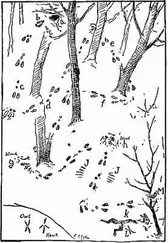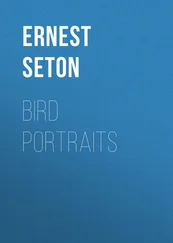Ernest Seton - Rolf in the Woods
Здесь есть возможность читать онлайн «Ernest Seton - Rolf in the Woods» весь текст электронной книги совершенно бесплатно (целиком полную версию без сокращений). В некоторых случаях можно слушать аудио, скачать через торрент в формате fb2 и присутствует краткое содержание. Год выпуска: 1997, Жанр: Приключения про индейцев, Исторические приключения, на английском языке. Описание произведения, (предисловие) а так же отзывы посетителей доступны на портале библиотеки ЛибКат.
- Название:Rolf in the Woods
- Автор:
- Жанр:
- Год:1997
- ISBN:нет данных
- Рейтинг книги:3 / 5. Голосов: 1
-
Избранное:Добавить в избранное
- Отзывы:
-
Ваша оценка:
- 60
- 1
- 2
- 3
- 4
- 5
Rolf in the Woods: краткое содержание, описание и аннотация
Предлагаем к чтению аннотацию, описание, краткое содержание или предисловие (зависит от того, что написал сам автор книги «Rolf in the Woods»). Если вы не нашли необходимую информацию о книге — напишите в комментариях, мы постараемся отыскать её.
Rolf in the Woods — читать онлайн бесплатно полную книгу (весь текст) целиком
Ниже представлен текст книги, разбитый по страницам. Система сохранения места последней прочитанной страницы, позволяет с удобством читать онлайн бесплатно книгу «Rolf in the Woods», без необходимости каждый раз заново искать на чём Вы остановились. Поставьте закладку, и сможете в любой момент перейти на страницу, на которой закончили чтение.
Интервал:
Закладка:
"It is a long way from here to the cabin," was Quonab's reply. "I could not hear you; Skookum could not hear you; but Cos Cob, my father, told me that when you send out a cry for help, you send medicine, too, that goes farther than the cry. May be so; I do not know: my father was very wise."
"Did you see Skookum come, Quonab?"
"No; he was with me hours after you left, but he was restless and whimpered. Then he left me and it was a long time before I heard him bark. It was the 'something-wrong' bark. I went. He brought me here."
"He must have followed my track all 'round the line."
After an hour they set out for the cabin. The ravens "Ha-ha-ed" and "Ho-ho-ed" as they went. Quonab took the fateful horn that Rolf had chopped off, and hung it on a sapling with a piece of tobacco and a red yam streamer ', to appease the evil spirit that surely was near. There it hung for years after, until the sapling grew to a tree that swallowed the horn, all but the tip, which rotted away.
Skookum took a final sniff at his fallen enemy, gave the body the customary expression of a dog's contempt, then led the procession homeward.
Not that day, not the next, but on the first day of calm, red, sunset sky, went Quonab to his hill of worship; and when the little fire that he lit sent up its thread of smoke, like a plumb-line from the red cloud over him, he burnt a pinch of tobacco, and, with face and arms upraised in the red light, he sang a new song:
"The evil one set a trap for my son,
But the Manito saved him;
In the form of a Skookum he saved him."
Chapter 34.
The Birch-bark Vessels
Rolf was sore and stiff for a week afterward; so was Skookum. There were times when Quonab was cold, moody, and silent for days. Then some milder wind would blow in the region of his heart and the bleak ice surface melted into running rills of memory or kindly emanation.
Just before the buck adventure, there had been an unpleasant time of chill and aloofness. It arose over little. Since the frost had come, sealing the waters outside, Quonab would wash his hands in the vessel that was also the bread pan. Rolf had New England ideas of propriety in cooking matters, and finally he forgot the respect due to age and experience. That was one reason why he went out alone that day. Now, with time to think things over, the obvious safeguard would be to have a wash bowl; but where to get it? In those days, tins were scarce and ex-pensive. It was the custom to look in the woods for nearly all the necessaries of life; and, guided by ancient custom and experience, they seldom looked in vain. Rolf had seen, and indeed made, watering troughs, pig troughs, sap troughs, hen troughs, etc., all his life, and he now set to work with the axe and a block of basswood to hew out a trough for a wash bowl. With adequate tools he might have made a good one; but, working with an axe and a stiff arm, the result was a very heavy, crude affair. It would indeed hold water, but it was almost impossible to dip it into the water hole, so that a dipper was needed.
When Quonab saw the plan and the result, he said: "In my father's lodge we had only birch bark. See; I shall make a bowl." He took from the storehouse a big roll of birch bark, gathered in warm weather (it can scarcely be done in cold), for use in repairing the canoe. Selecting a good part he cut out a square, two feet each way, and put it in the big pot which was full of boiling water. At the same time he soaked with it a bundle of wattap, or long fibrous roots of the white spruce, also gathered before the frost came, with a view to canoe repairs in the spring.
While these were softening in the hot water, he cut a couple of long splints of birch, as nearly as possible half an inch wide and an eighth of an inch thick, and put them to steep with the bark. Next he made two or three straddle pins or clamps, like clothes pegs, by splitting the ends of some sticks which had a knot at one end.
Now he took out the spruce roots, soft and pliant, and selecting a lot that were about an eighth of an inch in diameter, scraped off the bark and roughness, until he had a bundle of perhaps ten feet of soft, even, white cords.
The bark was laid flat and cut as below.
The rounding of A and B is necessary, for the holes of the sewing would tear the piece off if all were on the same line of grain. Each corner was now folded and doubled on itself (C), then held so with a straddle pin (D). The rim was trimmed so as to be flat where it crossed the fibre of the bark, and arched where it ran along. The pliant rods of birch were bent around this, and using the large awl to make holes, Quonab sewed the rim rods to the bark with an over-lapping stitch that made a smooth finish to the edge, and the birch-bark wash pan was complete. (E.) Much heavier bark can be used if the plan F G be followed, but it is hard to make it water-tight.
So now they had a wash pan and a cause of friction was removed. Rolf found it amusing as well as useful to make other bark vessels of varying sizes for dippers and dunnage. It was work that he could do now while he was resting and recovering and he became expert. After watching a fairly successful attempt at a box to hold fish-hooks and tackle, Quonab said: "In my father's lodge these would bear quill work in colours."
"That's so," said Rolf, remembering the birch-bark goods often sold by the Indians. "I wish we had a porcupine now."
"Maybe Skookum could find one," said the Indian, with a smile.
"Will you let me kill the next Kahk we find?"
"Yes, if you use the quills and burn its whiskers."
"Why burn its whiskers?"
"My father said it must be so. The smoke goes straight to the All-above; then the Manito knows we have killed, but we have remembered to kill only for use and to thank Him."
It was some days before they found a porcupine, and when they did, it was not necessary for them to kill it. But that belongs to another chapter.
They saved its skin with all its spears and hung it in the storehouse. The quills with the white bodies and ready-made needle at each end are admirable for embroidering, but they are white only.
"How can we dye them, Quonab?
"In the summer are many dyes; in winter they are hard to get. We can get some."
So forth he went to a hemlock tree, and cut till he could gather the inner pink bark, which, boiled with the quills, turned them a dull pink; similarly, alder bark furnished rich orange, and butternut bark a brown. Oak chips, with a few bits of iron in the pot, dyed black.
"Must wait till summer for red and green," said the Indian. "Red comes only from berries; the best is the blitum. We call it squaw-berry and mis-caw-wa, yellow comes from the yellow root (Hydrastis)."
But black, white, orange, pink, brown, and a dull red made by a double dip of orange and pink, are a good range of colour. The method in using the quills is simple. An awl to make holes in the bark for each; the rough parts behind are concealed afterward with a lining of bark stitched over them; and before the winter was over, Rolf had made a birch-bark box, decorated lid and all, with porcupine quill work, in which he kept the sable skin that was meant to buy Annette's new dress, the costume she had dreamed of, the ideal and splendid, almost unbelievable vision of her young life, ninety-five cents' worth of cotton print.
There was one other point of dangerous friction. Whenever it fell to Quonab to wash the dishes, he simply set them on the ground and let Skookum lick them off. This economical arrangement was satisfactory to Quonab, delightful to Skookum, and apparently justified by the finished product, but Rolf objected. The Indian said: "Don't he eat the same food as we do? You cannot tell if you do not see."
Читать дальшеИнтервал:
Закладка:
Похожие книги на «Rolf in the Woods»
Представляем Вашему вниманию похожие книги на «Rolf in the Woods» списком для выбора. Мы отобрали схожую по названию и смыслу литературу в надежде предоставить читателям больше вариантов отыскать новые, интересные, ещё непрочитанные произведения.
Обсуждение, отзывы о книге «Rolf in the Woods» и просто собственные мнения читателей. Оставьте ваши комментарии, напишите, что Вы думаете о произведении, его смысле или главных героях. Укажите что конкретно понравилось, а что нет, и почему Вы так считаете.




